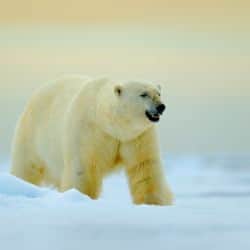Arctic Ice Loss – Polar Bears Fight For Survival

Ice loss in the Arctic is causing polar bears to use up to four times as much energy to survive according to new studies.
The apex predators are perfectly adapted to Arctic ice conditions, but as the ice becomes scarce their habitats are shrinking and their survival skills are less suited to the changing environment.
Adapting to survive
Polar bears are natural ‘lay in wait’ hunters which uses up very little energy. They catch seals by targeting the seals breathing holes in the ice. However, with less and less ice around the bears are having to work much harder to stay alive.
According to the study, published at the beginning of this year in the Journal of Experimental Biology, the sea ice on which the polar bears hunt has shrunk by 13% every decade over the past 40 years. The polar bears mainly try and feed on the energy rich blubber of ringed and bearded seals, but this food source is becoming harder to come by. The study says that polar bears now swim for an average 3 days to find seals, or they search for other less energy rich food travelling great distances to find it, such as caribou, Arctic char, and snow geese.
Facing starvation
The alternatives to seal meat are less energy rich and therefore pursuing them places the bears closer to starvation. The bears need to consume greater quantities of caribou, char and snow geese to equal the digestible energy of an adult seal.
The decline in polar bear numbers is likely to have a knock-on effect on other mammals that inhabit the ‘icy habitat’. Arctic foxes and musk oxen are similarly likely to be vulnerable to change.
Decline in Polar Bear numbers
The study suggests that we might see a global decline in polar bears between one and two thirds by end of this century. Reducing our carbon footprint is essential. The continued thawing of the Arctic ice will inevitably bring about a huge number of environmental issues so the sooner we do more to slow it down the better.
Polar bears, and other mammals suited to an ice rich environment will struggle to adapt as the ice melts. Researchers are confident that their numbers will fall significantly even without evidence of decline, simply by knowing the energetic cost to the bears of having to change their hunting habits. The fact that they have to travel much greater distances for less energy rich food is an environmental disaster unfolding before us.
If you would like to find out about supporting conservation efforts for polar bears then please visit our Adopt a Polar Bear page.



